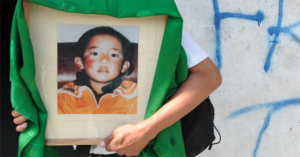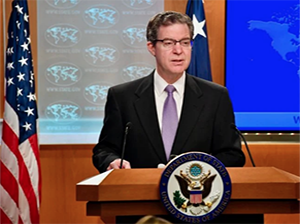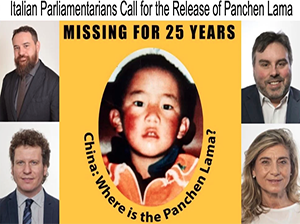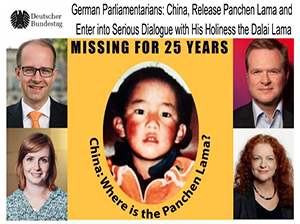 Three days after His Holiness the Dalai Lama chose the then six-year-old Gedhun Choekyi Nyima to be the 11th Panchen Lama in 1995, he and his family were abducted and imprisoned by the Chinese authorities. This made him the youngest political prisoner in the world and the outside world has no inkling of his whereabouts. No one has been allowed to visit him since.
Three days after His Holiness the Dalai Lama chose the then six-year-old Gedhun Choekyi Nyima to be the 11th Panchen Lama in 1995, he and his family were abducted and imprisoned by the Chinese authorities. This made him the youngest political prisoner in the world and the outside world has no inkling of his whereabouts. No one has been allowed to visit him since.
Today, more than two decades have passed, and leaders from across the world are calling on China for information on the Panchen Lama, who is considered the second-highest spiritual leader in Tibet after His Holiness the Dalai Lama.

Ambassador-at-Large for International Religious Freedom Sam Brownback
In the United States, Ambassador-at-Large for International Religious Freedom Sam Brownback expressed support for the call to China to release the Panchen Lama and to let the world know his whereabouts. He further expressed concerns over how the oppressive regime in China is making use of the ongoing global crisis — the COVID-19 pandemic — to further tyrannise the religious minorities through systematic denial of healthcare and accurate information.
Czech Senators have also signed a joint statement to this effect, extending their support and solidarity for Tibet for “their non-violent movement to find justice, peace and freedom for Tibet.” 16 Czech Parliamentarians urged China, in the joint statement, to release the Panchen Lama of Tibet and his family unconditionally, citing that China “has brought more destruction in Tibet than development” and that it needs “to respect the rights of Tibetan people and their unique cultural identity”.
In Italy too, Parliamentarians have stood in solidarity with the cause of Tibetan freedom, acknowledging the abduction of the Panchen Lama as a blatant human rights violation. Their concerns revolve around the Chinese oppression and abuse of the religious institutions as “a means to gain control over Tibetans.” They have joined the global call upon China to reveal the fate and whereabouts of Panchen Lama. Representative Chhimey Rigzen of the Tibet Bureau Geneva thanked them for their compassion and love in the midst of the pandemic.
The movement also garnered support from where four Parliamentarians, who comprise the Human Rights Policy Committee spokespersons for the four largest German parties in the Bundestag, have issued a joint statement to this effect. They are urging the Chinese government to allow contact with the Panchen Lama and to not violate the community’s religious freedom.
 The Tibet Support Group of the Riigikogu, the Parliament of Estonia, has made a statement condemning the acts of the Chinese régime and their oppression of the Tibetan culture and freedom. Lithuania, too, echoed the sentiment.
The Tibet Support Group of the Riigikogu, the Parliament of Estonia, has made a statement condemning the acts of the Chinese régime and their oppression of the Tibetan culture and freedom. Lithuania, too, echoed the sentiment.
The human rights violations suffered by Tibetans living under the Chinese régime, which include religious persecution and unprecedented cultural destruction, have not gone unnoticed. Over 159 organisations from 19 countries submitted a joint petition to the United Nations calling for intervention on the matter and to press China to release the Panchen Lama.






 Print
Print Email
Email